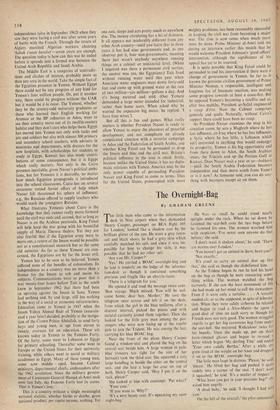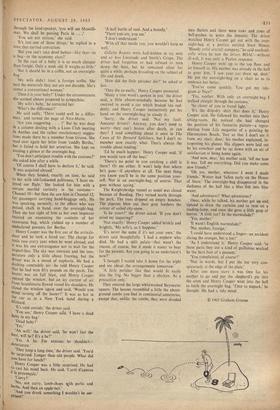The Overnight-Bag
By GRAHAM GREENE 'Tim little man who came to the information 1 desk in Nice airport when they demanded 'Henry Cooper, .passenger on BEA flight 105 for London,' looked like a shadow cast by the brilliant glitter of the sun. He wore a grey town- suit and black shoes; he had a grey skin which carefully matched his suit, and since it was im- possible for him to change his skin, it was possible that he had no other suit.
'Are you Mr. Cooper?'
'Yes.' He carried a BOAC overnight-bag and he laid it tenderly on the ledge of the informa- tion-desk as though it contained_ something precious and fragile like an electric-razor.
'There is a telegram for you.'
He opened it and read the message twice over. 'Bon voyage. Much missed. You will be wel- come home, dear boy. Mother.' He tore the telegram once across and left it on the desk, from which the girl in the blue uniform, after a discreet interval, picked the pieces and with natural curiosity joined them together. Then she looked for the little grey man among the pas- sengers who were now lining up at the tourist gate to join the Trident. He was among the last, carrying his blue BOAC bag.
Near the front of the plane Henry Cooper found a window-seat and placed the bag on the central seat beside him. A large woman in pale- blue trousers too tight for the size of her buttocks took the third seat. She squeezed a very large handbag in beside the other on the central seat, and she laid a large fur coat on top of both. Henry Cooper said, `May I put it on the rack, please?'
She looked at him with contempt. 'Put what?' 'Your coat.'
'If you want to. Why?'
'It's a very heavy coat. It's squashing my over- night-bag.' He itvas so small he could stand nearly upright under the rack. When he sat down he fastened the seat-belt over the two bags before he fastened his own. The woman watched him with suspicion. 'I've never seen anyone do that before,' she said.
'I don't want it shaken about,' he said. 'There are storms over London.'
`You haven't got an animal in there, have you?' "Not exactly.'.
'It's cruel to carry an animal shut up like that,' she said as though she disbelieved him.
As the Trident began its run he laid his hand on the bag as though he were reassuring some- thing within. The woman watched the bag narrowly. If she saw the least movement of life she had made up her'mind to call the stewardess.
Even if it were only a tortoise A tortoise needed air, or so she supposed, in spite of hiberna- tion. When they were safely airborne he relaxed and began to read a Nice-Mafia—he spent a good deal of time on each story as though his French were not very good. The woman struggled angrily to get her big cavernous bag from under the seat-belt. She muttered 'Ridiculous' twice for his benefit. Then she made up, put on thick horn-rimmed glasses and began to re-read a letter which began 'My darling Tiny' and ended 'Your own cuddly Bertha:. After a while she grew tired of the weight on her knee and dropped it on to the BOAC overnight bag.
The little man leapt in distress. 'Please,' he said. "please.' He lifted her bag and pushed it quite rudely into a corner of the seat. don't wan! it squashed,' he said. 'It's a matter of respect.' `What have you got in your precious bag?' shy asked him angrily. `A dead baby, he said. 'I thought I had told you.' 'On the left of the aircraft,' the pilot announcd through the loud-speaker, 'you will see Monteli- mar. We shall be passing Paris in . . `You are not serious,' she said.
'It's just one of those things,' he replied in a tone that carried conviction.
'But you can't take dead babies—like that—in a bag --in the economy class?'
'In the case of a baby it is so much cheaper than freight. Only a week old. It weighs so little.'
`But it should be in a coffin, not an overnight- bag.'
`My wife didn't trust a foreign coffin. She said the materials they use are not durable. She's rather a conventional woman.'
'Then it is youi baby?' Under the circumstances
she seemed almost prepared to sympathise.
`My wife's baby,' he corrected her.
`What's the difference?'
He said sadly, 'There could well be a differ-
ence,' and turned the page of Nice-Malin.
'Are you suggesting . . . ?' But he was deep in a column dealing with a Lions Club meeting in Antibes and the rather revolutionary sugges- tions made there by a member from Grasse. She read over again her letter from 'cuddly Bertha,' but it failed to hold her attention. She kept on stealing a glance at the overnight-bag.
`You don't anticipate trouble with the customs?' she asked him after a while.
`Of course I shall have to declare it,' .he said. `It was acquired abroad.'
When they landed, exactly on time, he said to her with old-fashioned politeness, 'I have en-
joyed our flight.' She looked for him with a certain morbid curiosity in the customs—
Channel 10—but then she saw him in Channel 12, for passengers carrying hand-baggage only, He Was speaking, earnestly, to the officer who was Poised, chalk in hand, over the overnight-bag.
Then she lost sight of him as her own inspector insisted on examining the contents of her cavernous bag, which yielded up a number of undeclared presents for Bertha.
Henry Cooper was the first out of the arrivals- door and he took a hired car. The charge for taxis rose every year when he went abroad, and it was his one extravagance not to wait for the airport-bus. The sky was overcast and the tem7 Perature only a little above freezing, but the driver was in a mood of euphoria. He had a dashing comradely air—he told Henry Cooper that he had won fifty pounds on the pools. The heater was on full blast, and Henry Cooper oPened the window, but an icy current of air from Scandinavia flowed round his shoulders. He closed the window again and said, 'Would you mind turning off the heater?' It was as hot in
the car as in a New York hotel during a blizzard.
'It's cold outside,' the driver said. 'You see,' Henry Cooper said, 'I have a dead baby in my bag.' 'Dead baby?' `Yes.'
`Ah well,' the driver said, 'he won't feel the heat, will he? It's a he?'
`Yes. A he, I'm anxious he shouldn't- . deteriorate.'
`They keep a long time,' the driver said. 'You'd be surprised. Longer than old people. What did You have for lunch?'
Henry Cooper was a little surprised. He had to cast his mind back. He said, 'Carre d'agneau a la provencale.' 'Curry?'
'No, not curry, lamb-chops v■ijth garlic and herbs. And then an apple-tart.' 'A half bottle of rosd. And a brandy.'
`There you are, you see.'
don't understand.'
`With all that inside you, you wouldn't keep so well.'
Gillette Razors were half-hidden in icy mist and so was Lucozade and Smith's Crisps. The driver had forgotten or had refused to turn down the heat, but he remained silent for quite a while, perhaps brooding on the subject of life and death.
'How did the little perisher die?' he asked at last.
`They die so easily,' Henry Cooper answered.
`Many a true word's spoken in jest,' the driver said, a little absent-mindedly because he had swerved to avoid a car which braked too sud- denly, and Henry Cooper instinctively put his hand on the overnight-bag to steady it.
'Sorry,' the driver said. 'Not my fault. Amateur drivers! Anyway, you don't need to worry—they can't bruise after death, or can they? I read something about it once in The Cases of Sir Bernard Spilshury, but I don't re- member now exactly what. That's always the trouble about reading.'
'I'd be much happier,' Henry Cooper said, 'if you would turn off the heat.'
'There's no point in you catching a chill is there? Or me either. It won't help him where he's gone—if anywhere at all. The next thing you know you'll be in the same position your- self. Not in an overnight-bag, of course. That goes without saying.'
The Knightsbridge tunnel as usual was closed because of flooding. They turned north through the park. The trees dripped on empty benches. The pigeons blew out their grey feathers the colour of soiled city-snow.
'Is he yours?' the driver asked. 'If you don't mind my inquiring'?'
`Not exactly.' Henry Cooper added briskly and brightly, 'My wife's, as it happens.'
'It's never the same if it's not your own,' the driver said thoughtfully. 'I had a nephew who died. He had a split palate—that wasn't the reason, of course, but it made it easier to bear for the parents. Are you going to an undertaker's now?'
'I thought I would take it home for the night and see about the arrangements tomorrow.'
'A little perisher like that would fit easily into the frig. No bigger than a chicken. As a precaution only.'
• They entered the large whitewashed Bayswater square. The houses resembled a little the above- ground tombs you find in continental cemeteries, except that, unlike the tombs, they were divided
into flatlets and there were rows and rows of bell-pushes to wake the inmates. The driver _ watched Henry Cooper get out with the over- night-bag at a portico entitled Stare House. `Bloody orful aircraft company,' he said mechani- cally when be saw the letters BOAC—without ill will, it was only a Pavlov •response.
Henry Cooper went up to the top floor and let himself in. His mother was already in the hall to greet him. 'I saw your car draw up, dear.' He put the overnight-bag on a chair so as to embrace her better.
`You've come quickly. You got my tele- gram at Nice?'
'Yes, mother. With only an overnight-bag I walked straight through the customs.'
`So clever of you to travel light.'
`It's the drip-dry shirt that does it,' Henry Cooper said. He followed his mother into their sitting-room. He noticed she had changed the position of his favourite picture—a repro- duction from Life magazine of a painting by Hieronymus Bosch. 'Just so that I don't see it from my chair, dear,' his mother explained, in- terpreting his glance. His slippers were laid out by his armchair and he sat down with an air of satisfaction at being home again.
`And now, dear,' his mother said, 'tell me how it was. Tell me everything. Did you make some new friends?'
'Oh yes, mother, wherever I went I made friends.' Winter had 'fallen early on the House of Stare.' The overnight-bag disappeared in the darkness of the hall like a blue fish into blue water.
`And adventures? What adventures?'
Once, while he talked, his mother got up and tiptoed to draw the curtains and to turn on a reading-lamp, and once she gave a little gasp of horror. 'A little toe? In the marmalade?'
'Yes, mother.'
'It wasn't English marmalade?'
'No, mother, foreign.'
`I could have understood a finger—an accident slicing the oranges, but a toe!'
'As I understand it,' Henry Cooper said, 'in those parts they use a kind of guillotine worked by the bare foot of a peasant.'
'You complained, of course?'
`Not in words, but I put the toe very con- spicuously at the edge of the plate.'
After one more story it was time for his mother to go and put the shepherd's pie into the oven and Henry Cooper went into the hall to fetch the overnight bag. 'Time to unpack,' he thought. He had a tidy mind.
© 1965 Graham Greene































 Previous page
Previous page